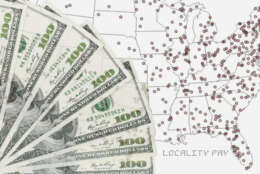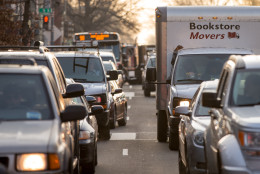locality pay
-
A 1% federal pay raise with no additional locality adjustments didn't noticeably accelerate salary compression in 2021. But plenty of GS-15s still bumped up against the arbitrary pay ceiling of $172,500 this year.
January 11, 2021 -
A pandemic, economic downturn and months of skepticism didn't change the plans the president issued last February, when he informed Congress of his intention to give most civilian employees a 1% federal pay raise in 2021.
January 04, 2021 -
President Donald Trump formalized a 1% across-the-board federal pay raise for civilian employees in 2021 via an executive order, which he signed Thursday night with hours to spare before the start of the new year.
January 01, 2021 -
In the President’s Pay Agent’s annual report to Congress released Dec. 17, the three presidentially appointed leaders emphasized the same concerns about the shortcomings of the GS system that many before them have and called on lawmakers to make significant changes.
December 24, 2020 -
The Federal Salary Council is not recommending any new areas for 2022. But the council did engage in debate over the future of the federal locality program.
October 21, 2020 -
The Trump administration will add Des Moines, Iowa, to its list of locality pay areas, bringing the total to 54. Adding a locality pay area will directly impact 3,100 federal employees, but the move could also have broader effects on the rest of the federal workforce, the Office of Personnel Management said.
October 14, 2020 -
Given the choice, would you take a reduced CSRS or FERS annuity later — for life — if it meant you could telework from the geographic location of your choice?
September 10, 2020 -
As Congress debates must-pass legislation for 2021, members are leaving many of the big-ticket federal workforce items on the table this year.
July 27, 2020 -
The Office of Personnel Management will propose new regulations establishing Des Moines, Iowa, a new brand new locality pay area. The move will impact at least 2,500 employees in the region.
July 09, 2020 -
The latest budget proposal from the House Appropriations Subcommittee on Financial Services and General Government made no mention of a federal pay raise in 2021. In their silence, House appropriators are essentially deferring to the president's proposed 1% pay raise for federal employees next year.
July 07, 2020 -
At least one agency, under a limited pilot program, allows its employees to work from anywhere in the United States, while accepting a duty station and locality pay change along with it. The benefits may be clear to agencies, but how about employees?
June 22, 2020 -
Lots of federal workers have said they might be willing to take a pay cut if they could do their jobs from a site a hundred miles from their home office.
June 18, 2020 -
Much of the federal workforce has spent the three months working from home. When work is about what you do, not where you do it, where does that leave locality pay?
June 15, 2020 -
If you could work from home, would you work for less? That’s not an option for federal workers, yet, but it could be part of the major upheaval many experts predict as the world comes out of and slowly adjusts to life after the pandemic.
June 09, 2020 -
After decades of watching as their annual pay raises shrink, including three consecutive pay freezes, white collar feds may have a reason to be hopeful.
January 31, 2020












